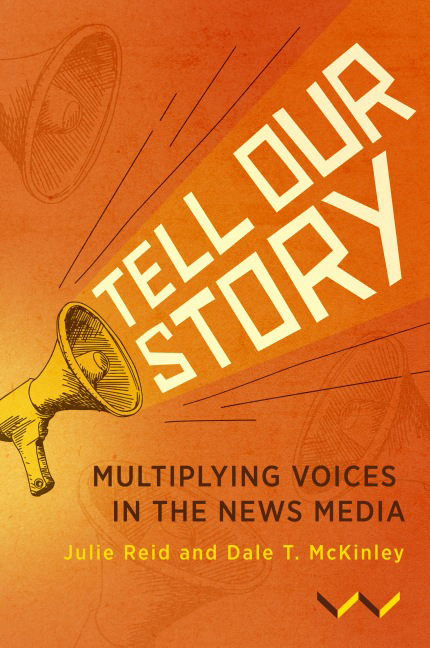Book contents
- Frontmatter
- Contents
- List of Figures
- Acknowledgements
- Abbreviations and Acronyms
- Chapter 1 The Importance of Voice and the Myth of the ‘Voiceless’
- PART 1 FROM THE INSIDE: VOICE(S) FROM THE GROUND
- Chapter 2 Community Perspective, Experience and Voice
- Chapter 3 Glebelands Hostel, Durban
- Chapter 4 Xolobeni, Eastern Cape
- Chapter 5 Thembelihle Community, Johannesburg
- PART 2 FROM THE OUTSIDE: DOMINANT VOICE
- Chapter 6 Dominant Media Telling and Elite Communication
- Chapter 7 The Political Economy of Dominant Power and Storytelling
- PART 3 NEW TRAJECTORIES FOR JOURNALISM AND VOICE(S)
- Chapter 8 Media Diversity and Voice(s)
- Chapter 9 Rethinking Media Freedom, Revamping Media Ethics
- Chapter 10 Planting the Seeds of Change
- Notes
- Bibliography
- Index
Chapter 9 - Rethinking Media Freedom, Revamping Media Ethics
Published online by Cambridge University Press: 10 September 2020
- Frontmatter
- Contents
- List of Figures
- Acknowledgements
- Abbreviations and Acronyms
- Chapter 1 The Importance of Voice and the Myth of the ‘Voiceless’
- PART 1 FROM THE INSIDE: VOICE(S) FROM THE GROUND
- Chapter 2 Community Perspective, Experience and Voice
- Chapter 3 Glebelands Hostel, Durban
- Chapter 4 Xolobeni, Eastern Cape
- Chapter 5 Thembelihle Community, Johannesburg
- PART 2 FROM THE OUTSIDE: DOMINANT VOICE
- Chapter 6 Dominant Media Telling and Elite Communication
- Chapter 7 The Political Economy of Dominant Power and Storytelling
- PART 3 NEW TRAJECTORIES FOR JOURNALISM AND VOICE(S)
- Chapter 8 Media Diversity and Voice(s)
- Chapter 9 Rethinking Media Freedom, Revamping Media Ethics
- Chapter 10 Planting the Seeds of Change
- Notes
- Bibliography
- Index
Summary
If journalism is a force of immense influence – and I think it is, and should be – then it surely deserves scrutiny.
— Alan Rusbridger, former editor-in-chief of The GuardianCRITIQUE IS NOT A CRIME
In a manner that resembles an almost automatic knee-jerk reaction, news media sector representatives, journalists and editors often respond to criticism of the press with assertions that the freedom and independence of the news media must be protected at all costs. For many, the freedom of the press is an infallible sacred cow. This line of argument is sometimes well placed, but at other times it is decidedly manipulative and unhelpful.
There is no question that the world's investigative news media suffers significant strain, resulting in part from the difficulties of financial sustainability and the crisis of credibility associated with delegitimisation campaigns and fake news. But it is also becoming increasingly more dangerous to be a journalist, especially for women. Direct threats to journalists, such as assassinations, death threats and intimidation, arrests and detention, or online trolling, are on the increase across the world. Political and governmental interference in the editorial independence of news outlets, politically connected media ownership and regulatory or legislative restrictions on freedom of expression and access to information are still prevalent in many countries, even in the second decade of the twenty-first century. The killing of journalists for reasons related to their investigative work is on the rise globally, and these cases are rarely investigated properly by the authorities. The resultant impunity means that the killers literally get away with murder (Posetti 2018b; UNESCO 2018).
Within this global context, it is easy to understand why journalists and media professionals automatically take up defensive positions when confronted with critiques of the profession. Journalists feel as though they are under attack, and they are. However, too often genuine critique and/ or evidence-based scrutiny of the news media's performance by media analysts is unreasonably equated with the tack of the sinister forces who intend to do media workers serious harm. But the two cannot simply be equated, and to tar them with the same brush, so to speak, is unfair. The rantings of a crooked politician who dismisses the news media's reportage as fake news, and calls for draconian media regulations in order to conceal his own corruption is one thing.
- Type
- Chapter
- Information
- Tell Our StoryMultiplying Voices in the News Media, pp. 161 - 184Publisher: Wits University PressPrint publication year: 2020



